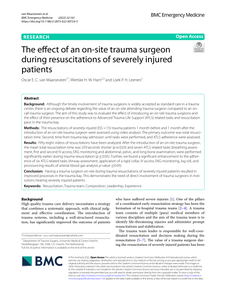Purpose: Resuscitation quality and pace depend on effective team coordination, which can be facilitated by adequate leadership. Our primary aim was to assess the influence of trauma team leader experience on resuscitation pace. Second, we investigated the influence of injury severity on resuscitation pace. Methods: The trauma team leaders were identified (Staff trauma surgeon vs Fellow trauma surgeon) and classified from video analysis during a 1-week period. Resuscitations were assessed for time to the treatment plan, total resuscitation time, and procedure time. Furthermore, patient and resuscitation characteristics were assessed and compared: age, gender, Injury Severity Score, Glasgow Coma Scale < 9, and the number (and duration) of surgical procedures during initial resuscitation. Correlations between total resuscitation time, Injury Severity Score, and time to treatment plan were calculated. Results: After adjustment for the time needed for procedures, the time to treatment plan and total resuscitation time was significantly shorter in resuscitations led by a Staff trauma surgeon compared to a Fellow trauma surgeon (median 648 s (IQR 472-813) vs 852 s (IQR 694-1256); p 0.01 resp. median 1280 s (IQR 979-1494) vs 1535 s (IQR 1247-1864), p 0.04). Surgical procedures were only performed during resuscitations led by Staff trauma surgeons (4 thorax drains, 1 endotracheal intubation, 1 closed fracture reduction). Moreover, a significant negative correlation (r: - 0.698, p < 0.01) between Injury Severity Score and resuscitation time was found. Conclusion: Experienced trauma team leaders may positively influence the pace of the resuscitation. Moreover, we found that the resuscitation pace increases when the patient is more severely injured.
LINK
Background: Non-technical errors, such as insufficient communication or leadership, are a major cause of medical failures during trauma resuscitation. Research on staffing variation among trauma teams on teamwork is still in their infancy. In this study, the extent of variation in trauma team staffing was assessed. Our hypothesis was that there would be a high variation in trauma team staffing. Methods: Trauma team composition of consecutive resuscitations of injured patients were evaluated using videos. All trauma team members that where part of a trauma team during a trauma resuscitation were identified and classified during a one-week period. Other outcomes were number of unique team members, number of new team members following the previous resuscitation and new team members following the previous resuscitation in the same shift (Day, Evening, Night). Results: All thirty-two analyzed resuscitations had a unique trauma team composition and 101 unique members were involved. A mean of 5.71 (SD 2.57) new members in teams of consecutive trauma resuscitations was found, which was two-third of the trauma team. Mean team members present during trauma resuscitation was 8.38 (SD 1.43). Most variation in staffing was among nurses (32 unique members), radiology technicians (22 unique members) and anesthetists (19 unique members). The least variation was among trauma surgeons (3 unique members) and ER physicians (3 unique members). Conclusion: We found an extremely high variation in trauma team staffing during thirty-two consecutive resuscitations at our level one trauma center which is incorporated in an academic teaching hospital. Further research is required to explore and prevent potential negative effects of staffing variation in trauma teams on teamwork, processes and patient related outcomes.
DOCUMENT

Background: Although the timely involvement of trauma surgeons is widely accepted as standard care in a trauma center, there is an ongoing debate regarding the value of an on-site attending trauma surgeon compared to an on-call trauma surgeon. The aim of this study was to evaluate the effect of introducing an on-site trauma surgeons and the effect of their presence on the adherence to Advanced Trauma Life Support (ATLS) related tasks and resuscitation pace in the trauma bay. Methods: The resuscitations of severely injured (ISS > 15) trauma patients 1 month before and 1 month after the introduction of an on-site trauma surgeon were assessed using video analysis. The primary outcome was total resuscitation time. Second, time from trauma bay admission until tasks were performed, and ATLS adherence were assessed. Results: Fifty-eight videos of resuscitations have been analyzed. After the introduction of an on-site trauma surgeon, the mean total resuscitation time was 259 seconds shorter (p = 0.03) and seven ATLS related tasks (breathing assessment, first and second IV access, EKG monitoring and abdominal, pelvic, and long bone examination; were performed significantly earlier during trauma resuscitation (p ≤ 0.05). Further, we found a significant enhancement to the adherence of six ATLS related tasks (Airway assessment, application of a rigid collar, IV access; EKG monitoring, log roll, and pronouncing results of arterial blood gas analysis; p-value ≤0.05). Conclusion: Having a trauma surgeon on-site during trauma resuscitations of severely injured patients resulted in improved processes in the trauma bay. This demonstrates the need of direct involvement of trauma surgeons in institutions treating severely injured patients.
DOCUMENT
